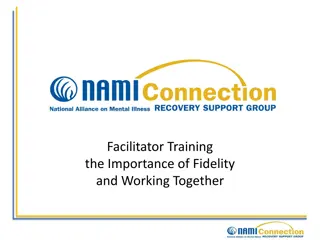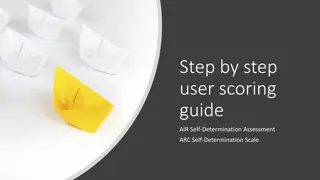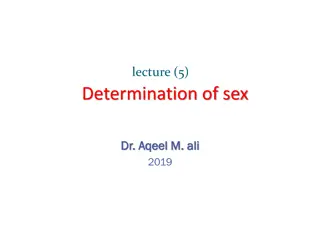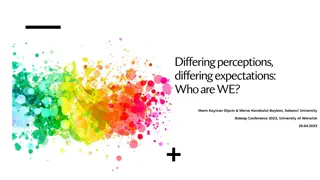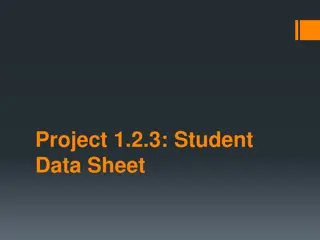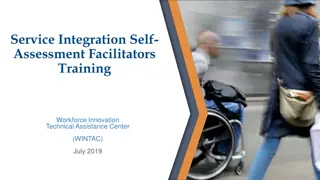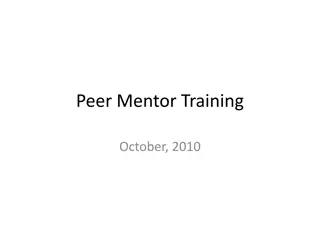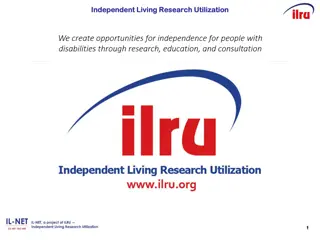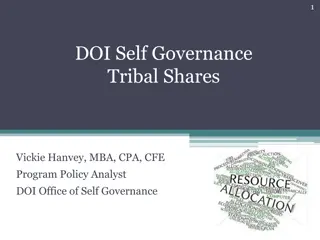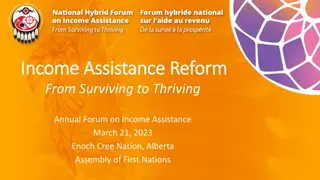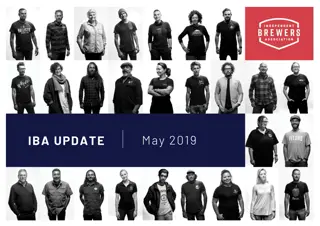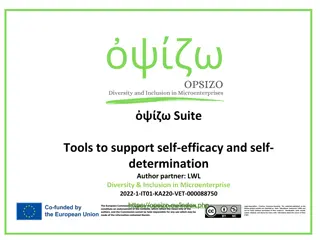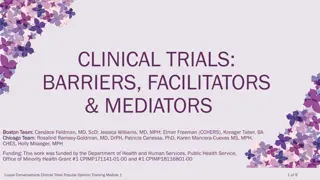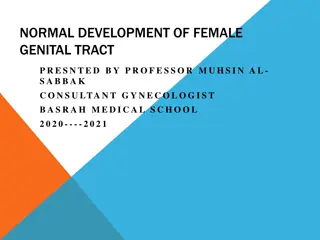Understanding Independent Facilitators in the Self-Determination Program
Unique to participants in the Self-Determination Program, Independent Facilitators (IFs) play a crucial role in assisting individuals with transitioning into SDP, finding resources, negotiating rates, and advocating at meetings. Participants may choose to have an IF or have their Service Coordinator serve in that role. Payments for IFs can come from the individual's budget/spending plan. IFs are not vendors of the Regional Center and may be paid by the Financial Management Service. The Lanterman Act prohibits increasing the individual budget to cover IF costs. Participants and their circle of support determine IF payment rates.
Download Presentation

Please find below an Image/Link to download the presentation.
The content on the website is provided AS IS for your information and personal use only. It may not be sold, licensed, or shared on other websites without obtaining consent from the author. Download presentation by click this link. If you encounter any issues during the download, it is possible that the publisher has removed the file from their server.
E N D
Presentation Transcript
An Independent Facilitator is a unique service available only to participants in the Self- Determination Program (SDP). An Independent Facilitator can assist an individual with transitioning into SDP, finding resources, negotiating rates, Person- Centered Planning (PCP), advocacy at an Individual Program Plan (IPP) meeting, and other tasks that might be selected by a participant or their Circle of Support.
Some IFs participate in, or even lead, the PCP process Searching for and connecting with resources and providers Payment arrangements. Advocating for you at an IPP, Individualized Education Plan (IEP), or other meetings. Transitioning from traditional services to SDP Help you make informed decisions about the money in your budget. Helping you identify your needs. Coordinating your providers to make sure your needs are met. Other things you may ask them to do!
In short: No A participant may choose not to have an Independent Facilitator A participant could also choose to have their Service Coordinator (SC) serve in the role of the Independent Facilitator Even if the participant chooses an outside IF, they will still have an assigned SC and the support of the RC. (The SC may change due to the participant s transition into SDP.) If the SC is requested to serve as the IF, this service will be provided at no cost to the participant. However, their role is limited. Specifically: The SC will not be able to scout for new services in the community. The SC will not be able to negotiate rates for services.
An IF does not necessarily need to be paid; someone may volunteer to serve in this role, or, if the SC is selected as the IF, they will not charge for this service. If the participant or their circle of support chooses to pay an IF, the payment is made from the individual budget/spending plan. Per the Lanterman Act, the individual budget may not be increased to account for these costs.
There are no set rates for an IF; the participant and their circle of support will choose how much to pay the IF. It may depend on how much the IF is being asked to do. Different IFs may charge different amounts. IFs are not vendors of Regional Center, and cannot be paid from Regional Center Purchase of Service (POS) funds until after the individual has successfully transitioned into SDP. The IF will be paid for by the Financial Management Service (FMS) If the IF is also the PCP, they may be paid for that service separately prior to transitioning into SDP.
Regional Center is not able to recommend an IF; however, the State Council on Developmental Disabilities (SCDD) has compiled a list of IFs, which can be forwarded to you upon request via contacting SelfDetermination@sclarc.org You may also select someone you know who is not on the list, such as a friend or family member, search the internet to find an IF, or ask other participants for recommendations. SCDD runs a Facebook group called California Self-Determination Program Forum where you may find recommendations. You are also encouraged to attend the monthly Self-Determination Program Local Advisory Committee (SDPLAC) Meetings from 6:00pm-7:30pm on the second Wednesday of each month, where you can connect with other participants and find resources.
An IF is required to be truly independent to ensure they are acting in your best interests and there are no conflicts. As such, they cannot provide any other service to you under your IPP, i.e. they cannot also be your respite provider or work with you on independent living skills. They also cannot work for any agency that provides you services under your IPP. The parent of a minor child participant, as well as the spouse of a married participant, may not be paid facilitating the participant s plan as an unpaid support. paid to be an IF, but they can assist with
Per the Lanterman Act, an IF is required to have training at their own expense in: The Person-Centered Planning Process The Principles of Self-Determination Responsibilities of an Independent Facilitator, including: Locating, accessing, and coordinating services and supports consistent with the participant s IPP Identifying immediate and long-term needs and developing options to meet those needs; Leading, participating, and/or advocating on behalf of participants in the person-centered planning process and development of the IPP; and, Obtaining identified services and supports. Any other tasks a participant may request of them.
Regional Center is not able to pay for the training of an IF under either Traditional Services or SDP If someone is interested in becoming an IF and needs training, they may contact SCDD or find other generic resources that are available. IF training has moved online during the COVID-19 pandemic! Some training is sometimes available at SCLARC s monthly SDPLAC meetings.
An IF is not required to have a certificate to show completion of training, but some may; it is up to you whether you choose to use someone who does or does not have a certificate. SCLARC is currently working on making cost- effective and culturally-sensitive training for IFs available in order to increase capacity in the catchment area.
When choosing an IF, you may want to interview several, and ask them questions, such as: How much do you know about California s SDP? You want to make sure they understand the principles of SDP, and how the program is different from the traditional Regional Center system. For example, the SDP participant is in charge of who gets hired and supervising staff and agencies. Bills go to an FMS and rates may not be the same as what SCLARC is paying under the traditional system. Services must ensure community inclusion. Providers do not have to be vendors nor have contracts with the Regional Center. What experience have you had as an IF? Have you had any training to be an IF? Have you ever facilitated a PCP? How many? What is your style? How do you prepare? How well do you know my community? Are you aware of activities in my area that I might be interested in?
Some more questions you may want to ask How would you go about helping me to find services to help me meet my goals? How will you help me figure out my budget and spending plan? Can you advocate for me at my IEP and IPP? Can you advocate for me to get benefits, such as Social Security Income (SSI) or In-Home Supportive Services (IHSS)? What do you know about the generic resources I will be required to access before I can receive Regional Center funding? Can you also help manage workers? How? How would you help me if I am unhappy with the job that one of my workers is doing? How will you keep in touch with other members of my support team? I have certain things that are really important to me (such as ) Are you willing to adapt your services to meet my specific needs and preferences? Are you willing to negotiate a price based on my specific needs? Given what you know about what I need, how much would you charge? When are you available to start?
You will want to think about what is important to you (what makes you happy) and what is important for you (what keeps you healthy and safe) and find a balance between them when selecting an IF (and any other service provider!) Do you need someone who speaks your language and/or understands your specific cultural background? Do you need it to be someone you trust, like a family member or friend? Is it important to you that the person not speak for you, or that they are not using their phone while they are with you?
Any Questions Or Comments , Transparent Cartoon, Free Cliparts ... SelfDetermination@sclarc.org SCLARC s Case Management Help Line: 1-833-725-2721 cmhelp@sclarc.org Available in English and Spanish
Contact: Armida Ochoa (English/Spanish) Aochoa@ochoasconsultingllc.com https://www.ochoasconsultingllc.com
Contact: Sonni Charness (English) or Taleen Khatchadourian (English) Sonni@guidelightgroup.org Taleen@guidelightgroup.org 310-883-8343 (office) https://www.guidelightgroup.org
Contact: Tami Pauly (English) tamra@personcenteredprojects.com 424-248-5608 https://www.personcenteredprojects.com
Contact: Gayle Gordon EmpowerTraining3@gmail.com 323-684-7558 https://www.empowertraining.org/
Contact: Catherine Baca MyLivingSpecialist@gmail.com (213) 590-2273 (CARE) https://www.mylivingspecialist.com
Contact: Rosie Lasca Rosie@AutismLA.us 424-299-6921/424-299-1531 https://www.autismla.org
Contact: Lara Okunubi (English) or Karla Melgar (English/Spanish) lokunubi@idealprogramsservices.org kmelgar@idealprogramsservices.org 310-701-8704
Contact: Linda Andron (English) Linda@AndronLCSW.com 310-963-2779
Contact: Diane Bernstein Desianer@gmail.com 818-943-8159
Thank you to everyone who supported our quiz night - St George's ... SelfDetermination@sclarc.org (English/Spanish) Naomi Hagel: NaomiH@sclarc.org/323-998-9519 (English) Odulia Juarez: OduliaJ@sclarc.org/213-765-3882 (English/Spanish)


